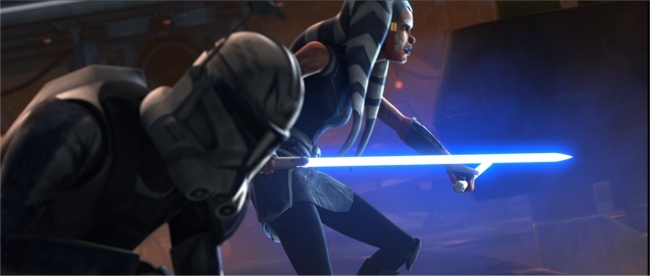Fall of the Clones

The final episode of Clone Wars is a great visual treat with pacing that appropriately lingers on its painterly images. From the destruction of the ship's reactor to Ahsoka jumping across falling debris to that lovely snow-swept epilogue. Director Nathaniel Villanueva delivered the goods in spades, it almost didn't matter how empty Dave Filoni's teleplay was.
Beginning immediately after the previous episode, we find Ahsoka (Ashley Eckstein) and Rex (Dee Bradley Baker) fighting their way out of the medbay against their former comrades. Surprisingly, Ahsoka spares a moment to tell Rex to put his blaster on stun because, after all, they don't want to kill any of their friends if they don't have to. When Ahsoka tells Rex that she let Maul (Sam Witwer) free to cause a distraction, Rex's reaction is astonishment. He clearly can't understand why Ahsoka thought this was a remotely good idea.

I think we can all agree with Rex in this reaction. Later, the nonsensical nature of Ahsoka's decision is referred to again in the form of Maul's taunt, reminding her she wanted "chaos". Along with a mention of the fact that Ahsoka is no longer a Jedi, so why should Order 66 even apply to her, a lot of the episode felt strangely like replies to fan criticism. Obviously the whole episode couldn't have been written and produced in one week so it seems to me someone screened the previous episode and then handed Filoni a bunch of notes long before the final season aired. The trouble is, he doesn't seem to have realised that acknowledging the problems isn't enough, especially with a mistake as big as Ahsoka setting Maul free.

There could have been a good scene of Ahsoka realising, in horror, what she'd done. Wondering to herself what she could have expected in sicing one of the galaxy's deadliest, most ruthless Force users on her friends. As it is, her motives are totally ambiguous and her strangely muted emotions make her come across as kind of dumb. We sympathise more with Rex, just as Anakin and Obi-wan seemed more sensible a couple episodes earlier when Ahsoka made that weird argument about how trying to prevent the Separatists from attacking Coruscant and kidnapping the Chancellor was just "playing politics". Again, the basic impression I have is that Dave Filoni has no idea how to write Ahsoka. Which is hardly surprising--before this final season of Clone Wars, he was a credited writer on only one episode, the finale of season two, which was co-written by Drew Z. Greenberg. Why is it, exactly, Dave Filoni has come to be seen as the great talent on Clone Wars and the potential saviour of the franchise?

My suspicion is that, before Disney bought Lucasfilm, Lucas promoted Filoni in order to downplay his own creative involvement. A heavily edited interview between George Lucas and Dave Filoni was released on YouTube last week and it makes clear what a hands-on approach Lucas took to the series.
A key point is when Filoni recollects advice Lucas apparently gave him multiple times:
FILONI: . . . you [Lucas] would watch stuff we did all the time and go, "What are you trying to say? What does that mean?" And I would explain it you and you would say, "That's great. Everything you said, do it there [pointing at the screen] because you're not going to be in people's homes to explain it to them."
Lucas constantly pushed Filoni to do better. Maybe without Lucas around, he doesn't see any reason to go that distance.
Filoni directly mocks Lucas' desire for a story arc about banking regulations, possibly referring to the season three episodes "Heroes on Both Sides" and "Pursuit of Peace". Filoni suggests this is something children can't relate to. I would argue that great children's fiction is often filled with things children have absolutely no frame of reference for. Think about the bank scene in Mary Poppins or the stuff about college and mortgages and taxes in the original Ghostbusters. If kids don't understand it, there's still stuff going on that they can understand--and then, the great part is, as they get older and find themselves confronting these problems, they can think back and maybe the stories they loved as a kid gave them a model they can still look to as adults. And by the way, those are two great episodes--with some terrific action sequences.

Whatever problems the final season may have, it is visually splendid and it will always have years of incredible television behind it.